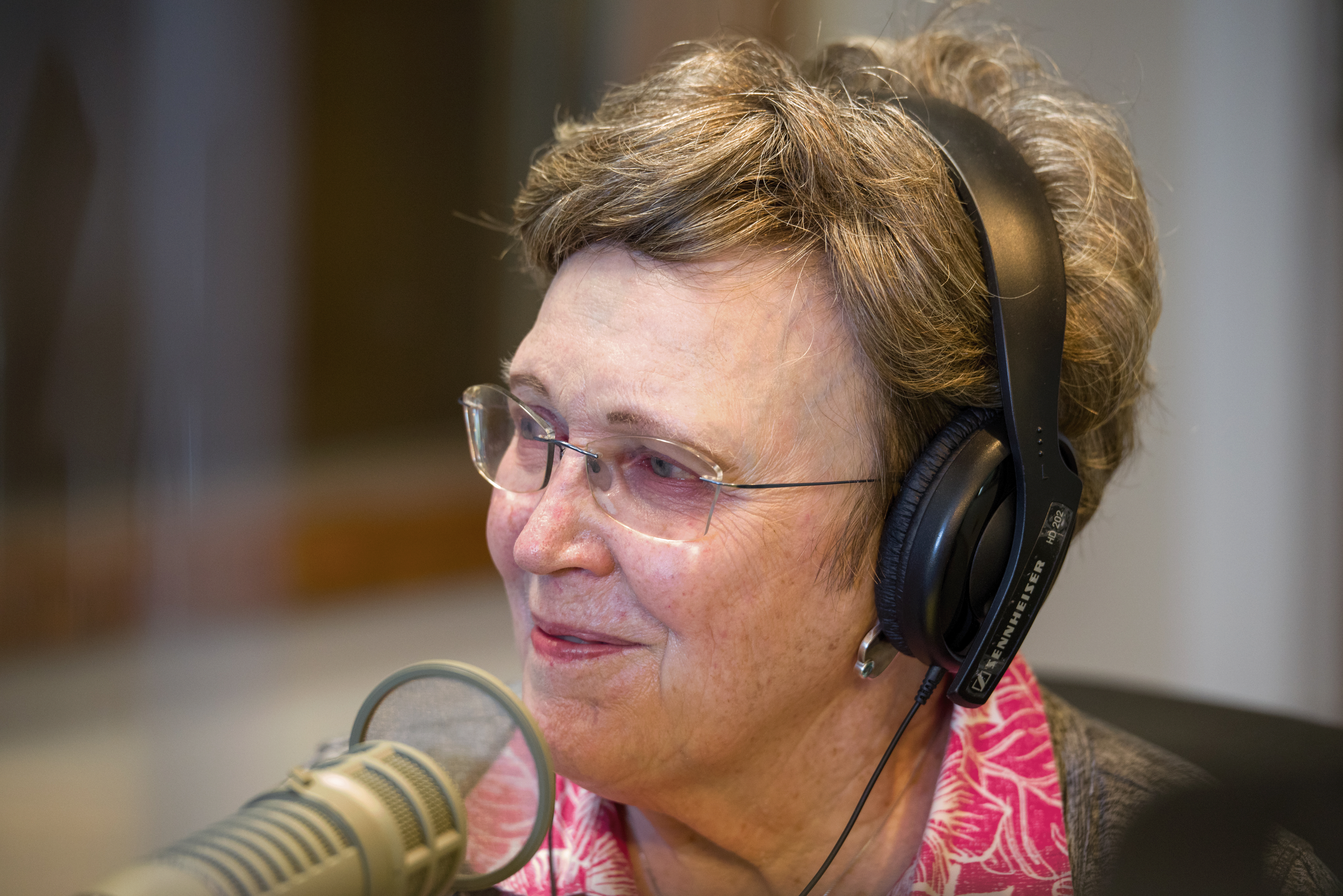Nancy Mack
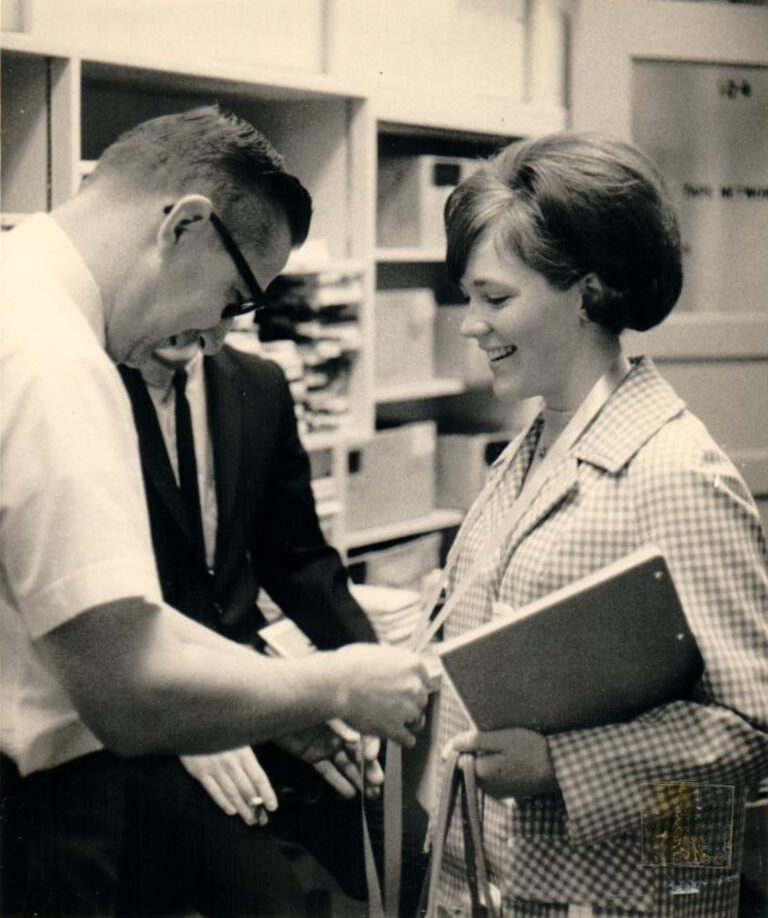
KWSU Radio & TV Alumna
Nancy Mack, (née Stack) was one of only three women specializing in radio and television broadcasting under Washington State University’s Communication department. She served as Alpha Epsilon Rho’s chapter president as well as its international-professional alumni coordinator. Nancy graduated from WSU in 1968.
After briefly working in television, and moving to Europe, she found herself pulled back to Pullman, where Nancy spent the majority of her professional career working at Washington State University in the continuing education field.
"I saw myself more as a pioneer."
Summary:
This year, Northwest Public Broadcasting has been taking a peek into the past to celebrate 100 years of broadcasting. Perhaps unsurprisingly, like most other American radio stations, the majority of accessible history has focused on and been documented solely by men. The first female announcers weren’t allowed on air until the 1940s and it was rare to hear a woman discuss news that didn’t involve fashion or homemaking until much later. In this interview with Classical Music Host Anjuli Dodhia, Nancy Mack recounts her time as a student working for the radio station in the 60s. She talks about her experience being the only woman at the time in a room full of men, surprisingly, she still holds a great deal of nostalgia and gratitude for that time in her life.
Anjuli: Nancy, just to start us off, tell us a little bit about your history with the station. How did you get involved? How long were you here? What was your role?
Nancy: I have been interested in broadcasting from an early age due to a friend in Seattle who worked at KOMO TV and had a woman’s television show. And I admired her ability to communicate clearly and use the medium to foster education. So I was interested in the broadcasting curriculum at WSU when I started as a freshman here in 1964, and I decided to major in radio and TV. I was really glad I did major in it, even though it was a little awkward because there were not many women majoring in the broadcasting at that time.
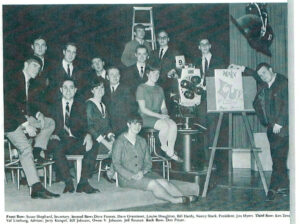
Front Row: Susan Shephard Second Row: Dave Fenner, Dave Overstreet, Louise Houghton, Bill Hardy, Nancy Stack, President: Jim Myers. Third Row: KenZera, Val Limburg, Advisor: Jerry Knispel, Bill Johnson, Owen V. Johnson, Jeff Rounce Back Row: Don Pitzer
Anjuli: What was it like to be in a minority like that?
Nancy: Well, at that time I held my ground quite well, I thought, because the gentlemen in the program treated me very well. They respected me. They tried to use the strengths of a woman to help them get across what they’re trying to do as well. So they used me somewhat as a resource now that I look back on it.
Anjuli: You said they wanted to kind of tap into the strength of a woman. Can you tell us a little bit more about what you mean by that?
Nancy: I guess what I mean is that at the time, women were seen as secretaries. They were seen as support people. I had skills in typing in shorthand that maybe they didn’t have. They were also, at the time, the station manager, Burt Harrison, was looking for ways to add programming on a local level. So he suggested that I put on a radio show called Women’s View of the News. And I simply ripped off the AP copy and read most of it. So it wasn’t very authentically original, but it was a woman’s view and a woman’s voice.
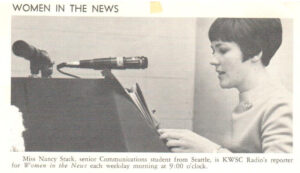
This newspaper clip features Nancy Mack in the year 1968. It reads,” Miss Nancy Stack , senior Communications student from Seattle is KWC Radio’s reporter for Women in the News (A Woman’s View of the News) each weekday morning at 9:00 o’clock.”
Nancy: And I think he understood that some of the demographics of the radio station at that time were women who were interested in hemlines in Paris or how to cook or clean and things like that. So it was very much focused on the way people thought at the time. I didn’t begrudge it. I sort of relished it because I felt like I had an inside view of how things worked. That’s how I felt I was used, and I thought at some point I would be using secretarial skills and communication skills when I had a job at the end of the four years.
Anjuli: I like that you say that you relished that role of your show Women in the News, because I think what has happened more recently is that a woman in journalism or in broadcasting wouldn’t want to necessarily have those, what we call fluff pieces today.
Nancy: Yeah, in a way, maybe I was being used, but I saw myself more as a pioneer. I felt like I was given way more opportunities maybe than some of the men because they wanted to put me into little segments of things that helped them show some diversity I guess. I’m just so grateful that women did play a bigger role and that they were hiring people with PhDs to do the kind of work that I thought I could do with bachelor’s degree.
Nancy: At the end of the day when I graduated in 1968, it was very difficult to get a job. Now, this was the baby boom echo era. There were many more people attending college, and jobs were harder to find at the time, so I didn’t set my expectations too high. And I really wasn’t interested in going in academic side of things. I was more interested in how the written word would be well communicated clearly to people.
"People wanted to know news quicker than we were able to get it to them."
Summary:
Although her career took a much different turn after graduation, Nancy acquired a variety of applicable and valuable skills during her time as a student at Washington State University. In this excerpt, Nancy explains why she majored in broadcasting, what it was like as an officer in Alpha Epsilon Rho and training she was receiving without even realizing it.
Anjuli: What made you choose broadcasting over journalism?
Nancy: Yeah, it was a hard choice to decide between journalism and broadcasting at the time, because they were really splitting them quite severely, and I really was interested in writing newspaper columns and how ads were created in the newspaper and different aspects of journalism. I took some classes in it, but I decided broadcasting was up and coming. I just always had the feel that people wanted to know news quicker than we were able to give it to them, and broadcasting was the way to get it into their homes and their minds and their cars. I just felt like I really wanted to be first to know the news, and then I wanted everyone else to know the news as quickly as I did.
Anjuli: What about the organization that you were a part of? How did that shape your time at WSU and in the College of Communication?
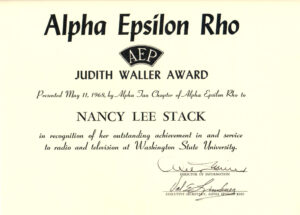
The AEP Judith Waller Award presented to Nancy Stack in May 1968
Nancy: Alpha Epsilon Rho was one of those national organizations that allowed us to go to national conventions and hear from people who were already out there in the field doing the job. When I would go to those meetings, I wasn’t paid attention to it all. I felt like I was really ignored, and it was very difficult to interact with the speakers and the people there. Often, they would have a session scheduled and I’d be the only one sitting in there listening to it.
If you had a local chapter, then you had officers, and I think I was an officer, probably secretary, that allowed me to understand that this was a nationwide occupation, and the growth areas and where the money was flowing, who was owning what. The networks were just starting to branch out and form in different ways, so there was a lot to learn.
Nancy: I never thought I’d manage anything, but I always felt like I could be a support person. What I ended up doing, however, after trying to work for Metro Media TV in San Francisco, and I did a summer internship at KOMO TV in Seattle, at the end of the day, I realized I really didn’t want to just splice cartoons and answer a switchboard. I was able to get a job in continuing education, and I did that job for 24 years at Washington State University using my communication skills and my marketing.
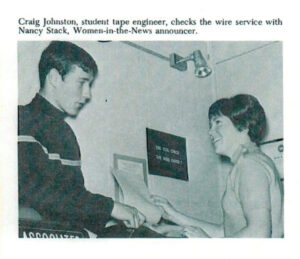
Craig Johnston and Nancy Stack check the wire service.
I guess I didn’t realize I was being well trained for that, but I have to say that anyone who majors in communications should consider working in the continuing education field. It involves all the aspects of training and learning other than just how the radio signal is broadcast and the engineering of it. You learn more about how to reach people, how to make them act because of what you’re saying. That was important because I had to write many brochures. At the time, we only marketed conferences through a mailed brochure, so the skills of writing and marketing were tucked into my education, even though I didn’t know I was doing that.
"This was a male domain when I was going to school."
Summary:
There is no more cigarette smoke in the halls, updated microphones and sound boards, women are producers; a lot has changed at this station since Nancy Mack went to school at WSU. Listen to this piece to hear Nancy compare the way news was delivered in the 70s with the way she sees it now. Also hear her share her favorite memory with her coworkers and friends.
Anjuli: I know this isn’t the first time that you’ve been to the station since you were a student, but what has changed or what changes have surprised you?
Nancy: Well, there’s no smoke in the halls. There was a lot of smoking going on then and it was obviously part of the deal. I didn’t smoke, so I was always offended by smoke. That’s nice.
The history of the building that this is in was, it was creaky to start with, now it’s less creaky and it’s much more upgraded and the radio station broadcasting board doesn’t look a thing like it did in the past. I think it’s come a long way because I see producers that are women, which is really unusual. There’s just no division there anymore. This was a male domain when I was going to school. I was infiltrating, treated like a specialty person. They put me into pictures just because I was the female. They were very friendly and happy people and if I wanted to try something, they would always let me try something. Like I wanted to try using the TV cameras and usually men did that job, but they put me on a stool and I did it.
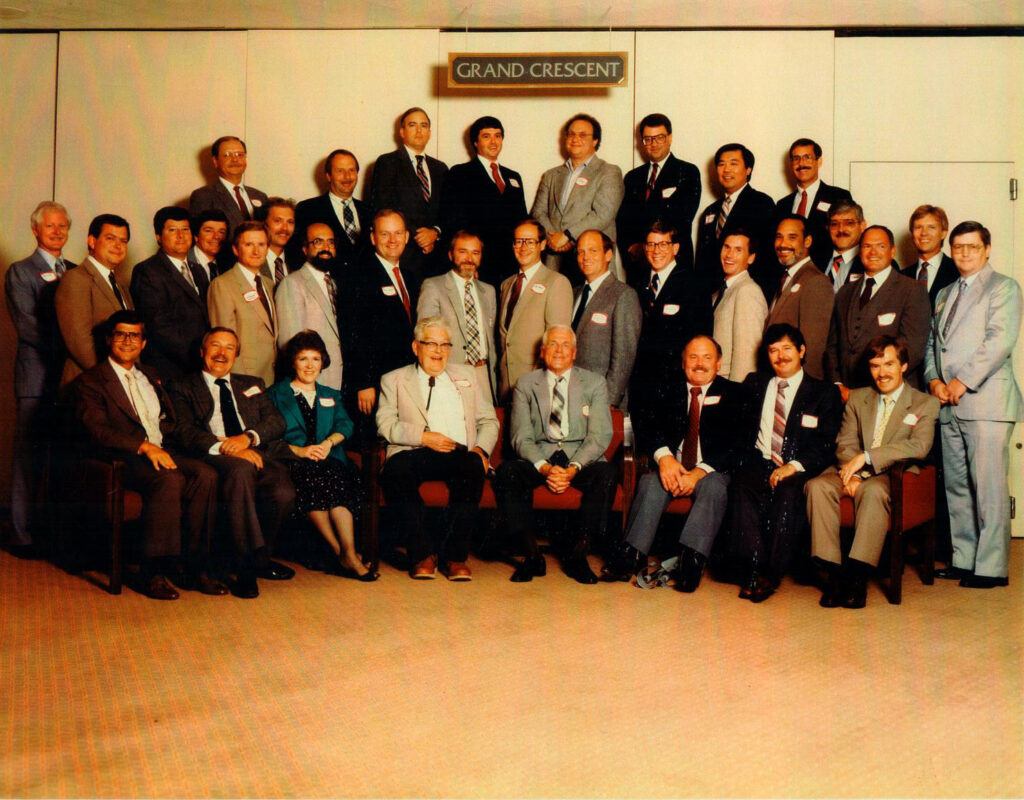
Nancy Mack at a class reunion.
Anjuli: What is your single favorite memory from your time at the station?
Nancy: I was a senior turning 21, and the guys at the station said, “Oh, let’s take you out for a drink.” I thought, “Oh yeah, I guess,” because I didn’t drink alcohol and I’m not really adept at that. They took me to the old Hilltop restaurant, which had a very nice bar and they started buying me a drink and they told me all about what was in it and how it was supposed to taste. I kept tasting things and they said, “Now try this one, now try this one.” They were so eager to educate me nicely in drinking. They had no alternative motives that I could detect. We were just having a really good time.
The guys were so sweet and very kind, and they got me home to the dorm, and we had hours where we had to be in by 11:00 PM or the house mother would check the dorm rooms. I got in just before 11:00 and I was feeling pretty happy and maybe a little dazed, and I was really eager to just hit the hay and put my night gown on and go to bed when the women in the dorm thrust in upon my room with a big birthday cake and a whole lot of juices and things. It was not what my stomach wanted to have at the moment. It was quite a shock. I think I looked pretty funny that night, but it endeared me to the relationship that I had with the other students in the department and how they were willing to help me learn things. That’s a big memory.
Anjuli: All kinds of things.
Nancy: All kinds of things.
Anjuli: It’s nice to hear that some things don’t change.
Nancy: Yeah.
Anjuli: You pay attention to the news. Have you sensed a change in how the news is presented or the kind of journalism that’s happening?
Nancy: At the time, there weren’t a lot of local radio shows. There was something called Barter Bureau where you could exchange goods on the radio. There might have been local cooperative extension agents talking about how to sew jeans or how to can something without getting poisoned.
The extent of news today is so dominated by the national feeds, and it’s not being created by the local woman behind the mic unless it’s a program that’s deliberately specific to your area. It’s really important to know who’s writing that. Who are these people that are creating the way that the news is presented? I think it’s still the role of NWPB to tell us that. Without NWPB, I think we would be swayed by stations that have more biased positions on topics and things that really don’t help our democracy and the future of our country, and the growth in the right direction.
